Aug 2021 2nd edition
Aug 2021 2nd edition Joy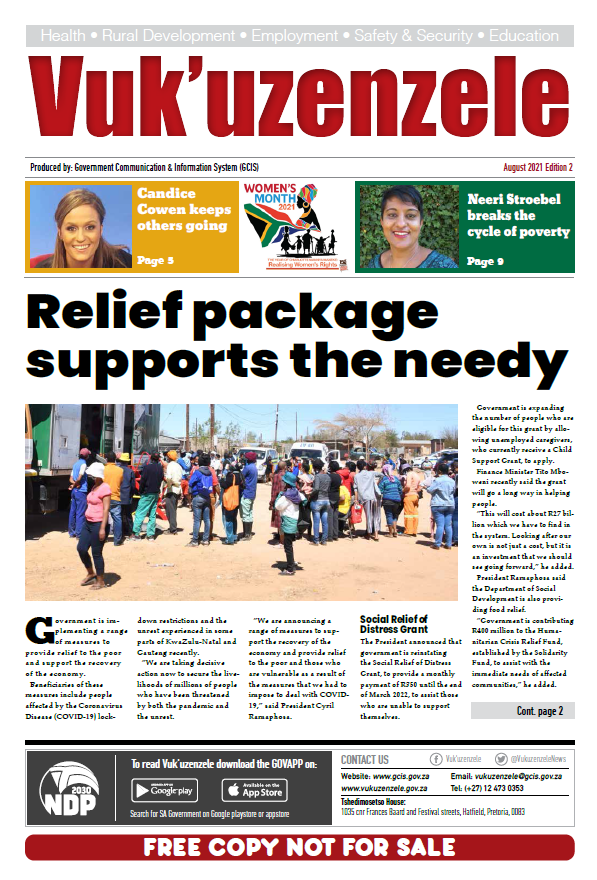
Translations
Afrikaans
isiNdebele
isiXhosa
isiZulu
Sepedi
Sesotho
Setswana
Siswati
Tshivenda
Xitsonga
Accelerate Her puts women on the right track
Accelerate Her puts women on the right track SiboneloLafarge South Africa and Volvo Trucks South Africa have joined forces to launch the AccelerateHer programme, which aims to increase the number of female owner-drivers rendering a service to Lafarge.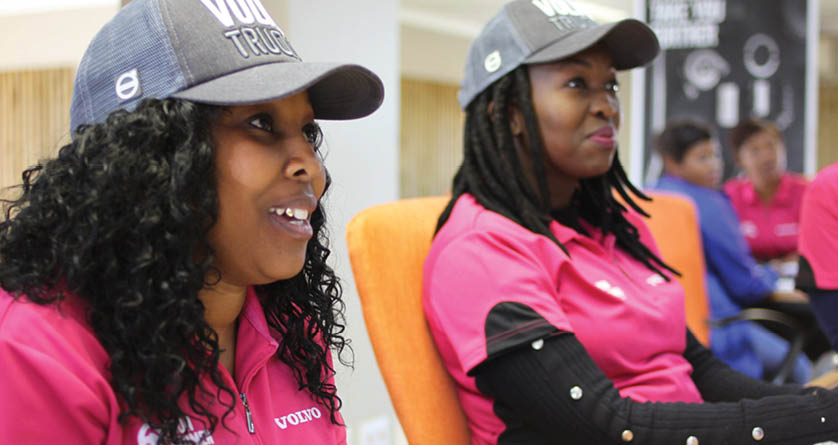
AccelerateHer will see 10 women in KwaZulu-Natal chosen to participate in the programme’s pilot phase.
The successful candidates will undergo a three-year training course at the Commercial Transport Academy, as part of Volvo Trucks’ Iron Women heavy commercial driver training programme.
The Iron Women programme, which has been running since 2019, teaches participants how to operate trucks safely, profitably and efficiently, in order to obtain a commercial driver qualification. They are also professionally mentored.
Once qualified, the women are incorporated into Lafarge KwaZulu-Natal’s operations, as active operators.
Programme graduate Dorah Lungile Mabaso says the graduates have broken many gender barriers in the industry and more women should come onboard.
“We can affect real change in the industry and challenge the norms, including creating dedicated facilities for female drivers at truck stops and safer operating conditions on long-haul routes,” she says.
The Vice President of Volvo Group Southern Africa, Marcus Hörberg, says the company is excited about the new doors that will open for women in transport because of the initiative.
“As a big supporter of the difference women can make in the industry, we are very proud and humbled that Volvo Trucks’ Iron Women project has developed and grown, and made a lasting impact in many people’s lives,” he adds.
The company aims to extend the programme to other areas of operation, throughout the country, in phases.
“In future, both companies want to involve more stakeholders, including provincial and national government, to expand the programme’s reach and impact,” says Hörberg.
Lafarge’s Aggregates and ReadyMix Director Noriko Solomon says women can only grow from this opportunity.
“We believe that given the correct resources and support, these women-owned transport businesses have the potential to flourish and make real change in their lives and communities.”
For more information about the programme, call Valentia Hobbs at 011 842 5000 or email valentia.hobbs@volvo.com.
Bonsmara bulls give farmers a boost
Bonsmara bulls give farmers a boost tsoanaYoung farmers have been given an opportunity by government to better the quality of their herds.
Ten young livestock farmers in the North West have each received a Bonsmara bull from the province’s Department of Agriculture and Rural Development.
North West MEC for Agriculture and Rural Development Desbo Mohono announced the donation during the department’s virtual improvement programme, Empowering Youth Through Livestock, which aims to boost young local farmers.
The department tapped into its reserves to improve the farmers’ herds.
“We know the price of bulls is exorbitant and our people, especially young farmers, cannot afford them,” said MEC Mohono.
The Bonsmara breed is known for its high-quality beef and resistance to local diseases. It’s considered a top-tier breed, as it has a good breeding index.
In 2018, a Bonsmara bull fetched one of the highest local prices when it was sold for R1.8 million at the Up George Bonsmaras’ 20th Annual Production Sale.
MEC Mohono said the department did not need to spend that much, as the bulls are produced at its research farms. They underwent rigorous testing, by the department’s researchers, before being donated to the farmers.
“Each and every bull has its own DNA history and, most importantly, its own performance score. The bloodline and the way in which bloodlines work in harmony are very important factors that were considered when selecting them,” she added.
The bulls should help the farmers improve profit margins and reproduction.
One of the recipients, Olerile Lekgetho, said adding the bull to his herd is bound to improve his business.
“The bull came at the right time. I had just tested my cows for pregnancy and 35 of them were negative. The bull means a lot to me. A bull is a huge investment that can produce good quality calves, which means good money at an auction. I’m very grateful for the bull.”
He hopes to be in a position to also donate bulls to young farmers in future
COVID-19
COVID-19 tsoanaHelp prevent the spread of respiratoriy disease like COVID-19
Wash your hands often with soap and water for at least 20 seconds
Cover your cough or sneeze with a tissue, then throw the tissue in the trash.
Stay home when you are sick , except to get medical care.
Avoid contact with people who are sick.
Avoid touching your eyes, nose and mouth.
Clean and disinfect frequently touched objects and surfaces.
COVID-19 HOTLINE : 0800 029 999
Department of Health.
Calling all authors of children’s stories
Calling all authors of children’s stories tsoanaIf you are a writer who has always wanted to have your children’s stories published, you now have an opportunity to do so.
Nal’ibali, a national reading-for-enjoyment campaign to spark children’s potential through storytelling and reading, is calling aspiring and seasoned writers to donate their original children’s stories f or publication.
or publication.
“The donated stories will help children fall in love with stories and promote and elevate all of our national languages,” says Nal’ibali’s Production and Translation Coordinator Nosiphiwo Sifumba.
“Authors will be acknowledged for their story, whether used on radio or in print,” she adds.
The authors’ work may be written in any of South Africa’s official languages and each story will be translated by the organisation into all other official languages. Those who want to write in a foreign language, may also do so.
“South Africa faces a critical shortage of children’s literature in indigenous languages and Nal’ibali believes it is these stories that motivate and inspire children to learn to read and help them sustain this essential habit,” says Sifumba.
Writers can submit as many stories as they like, however they must never have been submitted for publishing in any other book or to any other publisher. Submissions must be relevant to children between the ages of five and eight.
“We share these stories on radio, in our story book and in newspaper supplements.
“Nal’ibali aims to grow children’s love of stories, rather than teach them educational concepts or content that they learn at school. We want children to link stories to pleasure,” says Sifumba.
Interested authors can read or listen to some of the stories that have already been submitted at https://nalibali.org/story-library/audio-stories
Criteria for submission
If you submit a story in a language other than English, also send a summary of the story in English (maximum 50 to 100 words). You must indicate which language you have used.
Handwritten stories will not be accepted. Each story must be submitted as a separate MS Word document, via email. You must include your full name, contact number and physical address.
Submitted stories must be between 775 and 900 words.
Stories can be submitted to Nal’ibali via email: stories@nalibali.org
Candice Cowen keeps others going
Candice Cowen keeps others going JoyCOVID-19 heroine stresses that mental health is an important aspect to happiness and quality of life.
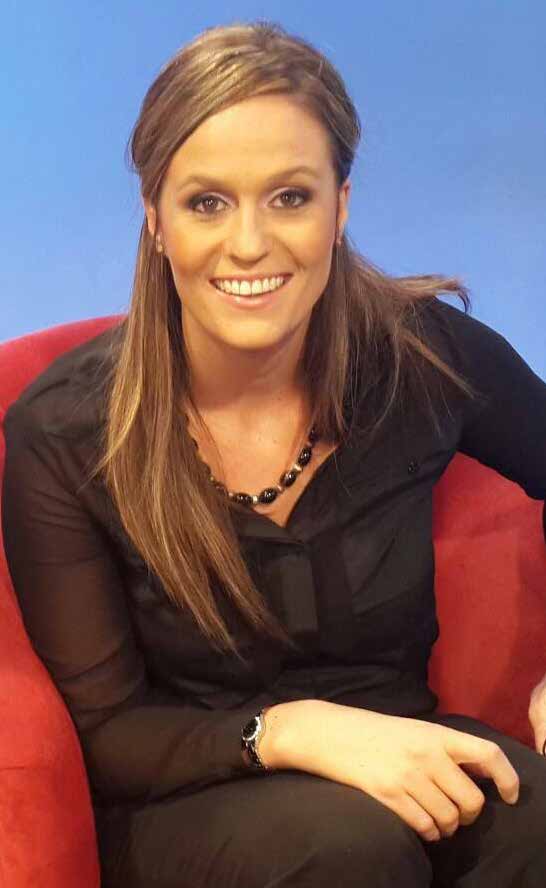 Mental health workers have had their work cut out for them during the Coronavirus Disease (COVID-19) pandemic.
Mental health workers have had their work cut out for them during the Coronavirus Disease (COVID-19) pandemic.
They have had to ensure people’s mental health, while putting their own fears, anxiety and heartbreak on the backburner.
Candice Cowen (34), a clinical psychologist from Northcliff in Gauteng, is one of these COVID-19 heroines. Despite having multiple family members – from elders to young cousins – who have contracted the virus, she has put her own feelings and anxieties aside to be there for others.
“It has been extremely worrying and stressful. I have a two-year-old son, and a husband with a compromised immune system, so we are all taking the necessary and sometimes extra precautions,” says Cowen.
Staying positive
She adds that not interacting with her extended family is extremely difficult but the sacrifice is a necessary one.
“We are mindful that the cost of someone’s life outweighs the short-term enjoyment of a visit. We check in on each other weekly and are trying to remain positive."
Cowen was vaccinated in March at Charlotte Maxeke Hospital in Johannesburg.
Even though the emotional toll has increased during the pandemic, she is motivated by her calling to help others.
“Our training as psychcologists prepares us to deal with trauma and loss. After so many years, that comes more naturally to me and I am able to ‘park’ my own stuff until I have the appropriate time to process it.”
Cowen adds that compassion fatigue and burnout are real dangers for healthcare workers.
“The duration of the pandemic and its effects are negative, uncertain and worrying. Being surrounded by death and future anxiety certainly plays a role in burnout.
“This pandemic is like no other, as the psychological wave has only begun, and that’s worrying.”
Making a difference
Born in Ruimsig on the West Rand, Cowen is part of the CBT Group and is affiliated to the South African Depression and Anxiety Group (SADAG). She helps educate the public about mental health and mental illnesses.
Cowen became a clinical psychologist because she wanted to make a difference, particularly for children and their families.
“The idea that early intervention leads to prevention makes me feel hopeful. This largely led me to go into psychology. I have a natural level of empathy and compassion for others and have always been drawn to helping others and seeing them succeed through limitations or hardships,” she says.
Working on the frontline, Cowen has seen an increase in people suffering from anxiety and depression.
While she says that there is also a risk of an increase in the suicide rate.
“Suicide rates in South Africa are extremely high, pandemic or no pandemic. Unfortunately, there has been an increase in depression due to job loss, financial stress and lockdown fatigue, among others.
“This all contributes negatively to mental health. Without positive buffers in place, it’s inevitable to see an increase in suicide rates.”
Reaching out in lockdown
Lockdowns have greatly influenced how Cowen is able to assist her patients.
“People are scared to leave their homes and movement has been restricted. Not everyone has access to quality WiFi or fibre, which means many people are going without emotional support.”
She says the pandemic has shifted psychology and access to mental health to mostly telepsychology consultations, using platforms like Zoom.
“While these have enabled access to therapy, they are not the same as face-to-face conversations.
“I rely on body language to read a situation or emotion. Online does its job, but some of the quality is lost through the screen,” Cowen adds.
Get help
She urges mental health workers to get help for their own anxiety.
“We are all in this pandemic together and we are all experiencing uncertainty and anxiety. Implementing
mental health check-ins is paramount to you being able to do your job of helping others.”
To those suffering from depression and anxiety, Cowen says you are not alone.
“The world is full of loneliness, negativity, sadness, loss and worry. These feelings are difficult, but normal under the circumstances© It has been a difficult year-and-a-half and it’s okay not to be okay.
“Try to take time out from worrying or over thinking and use this time to reflect on mindfulness, breathing and relaxation," she adds.
If you need assistance for mental health issues, contact SADAG on 0800 567 567.
Cooperative thrives during pandemic
Cooperative thrives during pandemic SiboneloWhile starting a business or keeping one running can be difficult on your own, joining forces with others who share a common goal can bring about greater success.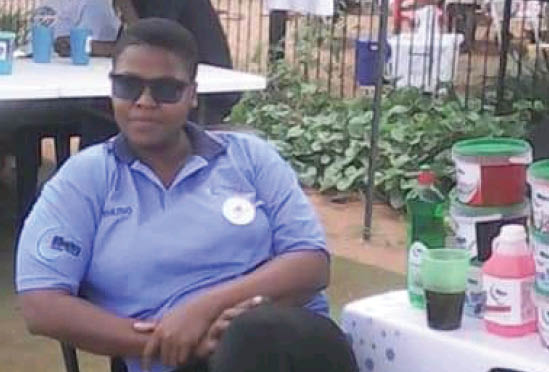
This was the case for Thuso Motau (37) from Mabopane in Pretoria, who is the Chairperson and Co-founder of Ipadts 33 Primary Cooperative Limited.
The cooperative was established in 2013, as part of the City of Tshwane’s Tshepo 10 000 programme.
Managed by the city’s Economic Development Unit, the programme aims to empower unemployed youth in Gauteng through skills development, entrepreneurship and financial literacy training, and by providing information about cooperatives and how they operate.
Motau says the initiative was launched at the perfect time, as she was unemployed and wanted to start a business.
“I had no idea what cooperatives were, but the thorough and intensive information and training inspired my team members and I to give it our best shot. I learnt that working together with a group of individuals to achieve a common goal can lead to success,” she adds.
The cooperative, which operates from the industrial site in Zone 15 in Ga-Rankuwa, provided water and sanitation services to the city from 2013 to 2016. “We fixed leaking taps and installed meter boxes, among other services. However, this was not sustainable,” says Motau.
The cooperative then decided to manufacture cleaning products, under the Mighty Superpower brand, which include dishwashing liquid, pine gel, regular bleach, hand soap, tile cleaner, car wash and wax, degreaser and floor polish.
Unlike many small businesses, Motau’s cooperative was not badly affected by the Coronavirus Disease pandemic. It actually boosted the business, which has created seven jobs.
“When the first national lockdown was announced sales skyrocketed as people and businesses needed cleaning products and hand wash soaps. We even introduced a hand and surface sanitiser and disinfecting services,” she adds.
During the 2018/19 financial year, the cooperative received a grant of just over R38 000 from the National Development Agency (NDA) to sustain jobs and expand its business operations and production capacity. It also received training in financial and conflict management, the Cooperative Legislative Act and project management.
“This equipped us with practical tools to run a professional business. We used some of the grant to buy equipment and improve our brand,” says Motau.
For more information about NDA funding for cooperatives, visit www.nda.org.za or call 011 018 5500.
Help learners cope with COVID-19
Help learners cope with COVID-19 SiboneloParents and teachers can help learners cope with the anxiety and depression they are experiencing because of the Coronavirus Disease pandemic.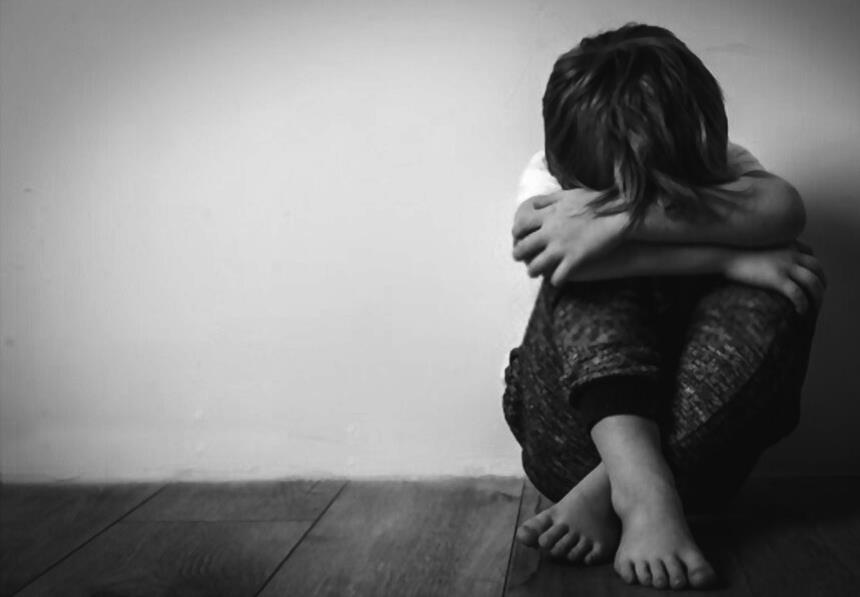
Learners have been faced with many challenges as a result of the Coronavirus Disease (COVID-19) and the lockdown restrictions.
There has been constant change in the learning environment at South Africa’s schools, which can leave learners feeling anxious and fearful.
Learners have had to navigate a new world of online or delayed learning, social isolation, loss, grief and trauma, all of which can cause increased anxiety and depression.
Counselling psychologist Boitumelo Tlhapane, who works for the Inclusive Education Unit at the Free State Department of Education, says feeling anxious or depressed during these trying times is understandable.
“For about a-year-and-a-half now, learners have had to adjust to a new way of learning, with less contact and teaching time.
“Many have had to study independently, while living with uncertainty about their future and the impact of COVID-19 on their hopes and dreams, family and social life,” says Tlhapane.
How to cope
She explains that anxiety is the fear of or worrying about something that has an uncertain outcome. To help learners to cope, she offers the following advice:
- Understand that it is normal to be anxious or fearful. This does not mean that you are weak. It is okay to not be okay.
- What you do with your fear is what is important. Are you obeying all the COVID-19 rules that have put in place to protect you and others? What else can you do to ensure your and others’ safety?
- Do you have reliable information about COVID-19 in case you or a loved one gets infected?
- Do you have the support of teachers, family and friends to help you when you feel uncertain or stressed or anxious? This is very important.
Teachers can also provide non-contact support and learning through online material and study groups; by setting up reminders to motivate learners to study at home; and by encouraging them to communicate their fears about schooling.
“This is important, especially for subjects that learners find challenging,” she adds.
Family and friends can provide learners with emotional support, in the form of encouragement and constant reassurance, says Tlhapane.
“Learners need to be constantly reminded that their efforts and dedication are recognised and appreciated, thus increasing their confidence.”
How to reduce anxiety
Tlhapane says there are various ways that parents and learners can reduce anxiety. These include:
- Ensure that there is a strict routine for studying, sleeping and socialising. This will help learners meet their goals and deadlines, while helping them to feel in control of their studies.
- Learners must use all of the available resources provided at school and on educational programmes, in line with the curriculum, that are broadcast on television and radio.
- Parents can assist by ensuring that learners are not overexposed to COVID-19 news, especially around death and conspiracy theories, as this may fuel their fears and lead to more psychological conditions.
- Learners should limit social media consumption, as it wastes study time and is a major distraction.
- The family can adapt their lifestyle by adding self-care tasks, such as physical exercise and play.
“If a learner loses a loved one, they may experience grief symptoms that resemble depression or anxiety.
“It is important that the school and the parents refer these learners for psycho-social support, which is provided by the Department of Basic Education, or consult free resources or local clinics for a referral,” says Tlhapane.
Signs of distress
Parents should be alert and watch for various signs that may indicate that their child is in distress. These include:
- The child being withdrawn and isolating from others.
- Irregular eating and sleep patterns.
- Being overly emotional, such as constantly crying, irritable moods or losing their temper quickly.
- Struggling to concentrate.
- Not completing tasks and homework.
- Behavioural problems, such as aggressiveness.
- Making up excuses not to go to school.
- Constantly on the phone or social media networks.
- Fails to complete other tasks of daily living.
For assistance, parents and learners can visit the department’s district offices. You can also contact the South African Depression and Anxiety Group, at 0800 567 567 or send an SMS to 31393 and a counsellor will call you back.
Inclusive communities critical to SA’s success
Inclusive communities critical to SA’s success JoyWhile the violence and destruction that engulfed parts of KwaZulu-Natal and Gauteng recently caused much damage to property and livelihoods, it also had a huge impact on the cohesion of our communities.
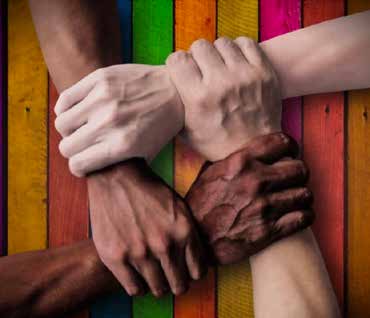 This was most evident in the tragic events that took place in and around Phoenix in eThekwini.
This was most evident in the tragic events that took place in and around Phoenix in eThekwini.
During some of the worst unrest in our democracy, and in a climate already thick with suspicion and paranoia, people that had lived side-by-side in relative peace turned on each other.
There is still much we have to unearth about the events that took place. The proliferation of fake news, doctored images and incorrect information has made it difficult to separate fact from fiction.
But we do know from official reports and personal accounts that people were racially profiled at illegal roadblocks, some people were pulled out of cars and beaten, and some were humiliated and degraded. Several people were killed.
Much of what has happened is the inevitable outcome when people take the law into their own hands. Vigilantism will not be tolerated in this country. It is criminal and it is dangerous.
Now that calm has been restored to the affected areas, our law enforcement agencies are investigating all acts of criminality.
A team of detectives has been assigned to deal with the murders and are working closely with local communities. There have been arrests and those responsible will face the full might of the law.
Much of the narrative around the events in Phoenix has been dominated by attempts to turn one race against another. It has been stoked by anonymous people on social media and in messaging groups making outrageous claims and calling for revenge.
There is an attempt to present this as a sign of imploding race relations between African and Indian communities.
Just as there were people who tried to exploit people’s vulnerability and cause mayhem, there are those who want to present criminal acts in racial terms to serve their own purposes.
They will not succeed. South Africa has a proud history of principled non-racialism and working class solidarity. African and Indian communities were united in the struggle against apartheid and, together with other communities, remain committed to a united and democratic society.
In response to the fear and mistrust, the people of Phoenix and the neighbouring areas of Bhambayi, Zwelitsha and Amaoti are working to repair the damage.
Aided by a peace forum established by the South African Police Service in partnership with community leaders, the communities have come together to support those affected by the unrest and to open channels of dialogue.
This is not the only part of the country that is confronted with such challenges.
Our efforts to build integrated communities are frustrated by the legacy of apartheid planning and persistent inequality.
Our cities, towns and rural areas are still all divided by both race and class. This discourages cooperation and understanding, and hampers the work we have undertaken to build a non-racial society.
Correcting these spatial distortions must be part of our work of building an inclusive economy and improving the living conditions of all South Africans.
It is why we are working to build flourishing township and rural economies, and focusing on the growth of small businesses. It is why we are investing in infrastructure in these areas and working to improve the provision of services.
At the same time, we need to confront racism in our society. We need to have honest conversations not only about our attitudes to one another, but also about the material conditions that divide us.
For as long as the division of wealth and opportunity in South Africa is largely still determined by race and gender, we will not be able to build a truly united nation.
The events in Phoenix are a painful reminder of how much work we still need to do to build inclusive communities that have successfully broken down the boundaries of the past.
These events also demonstrate how determined some people are to divide us, and how we need to do everything we can to resist them.
It is our collective responsibility to support these communities in eThekwini and elsewhere in their journey towards reconciliation and healing.
Our democracy was built by peacemakers and bridge-builders. The architects of our freedom were African, Indian, coloured and white men and women of great courage who chose the path of reconciliation over retribution, and of peace over war.
As we strive to heal from this collective national trauma, let us stand as one. Let us overcome our differences in pursuit of the common good.
Let us work together to forge a common future in which everyone has an equal share.
Lerato Manaka makes second chances a reality
Lerato Manaka makes second chances a reality tsoanaEx-offenders, who often battle to find employment due to their criminal record, are being given a helping hand.
After serving an eight-year jail sentence for defrauding her previous employer, Lerato Manaka (37) is dedicating her time to helping other ex-offenders make a living using their talents and skills gained in prison programmes.
Manaka, who lives in Johannesburg, was released on parole last year.
As part of her rehabilitation programme, she is using the Modiehi Mongale Foundation (MMF), which she established prior to being imprisoned, to drive change in people’s lives.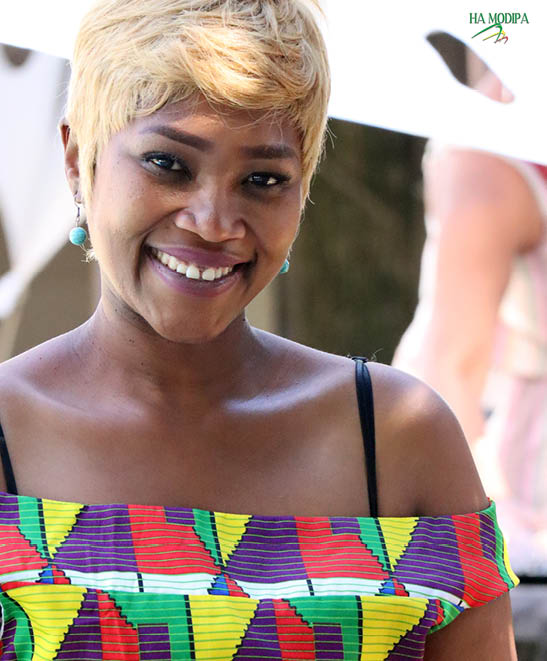
The business management graduate says she re-established the foundation, which has 30 female and 15 male registered beneficiaries, when she was released.
“I aim to address socio-economic issues among ex-offenders because they are not employable due to their criminal records.
“I also want to help reduce the cycle of re-offending. Jobs are scarce, especially when you have a criminal record. Due to the stigma and pressures of unemployment and poverty, many re-offend,” says Manaka.
While in prison, Manaka was appointed to represent 210 inmates on the Sports, Recreational, Arts and Culture Committee.
“My portfolio included arts and culture. This is where I noticed a tremendous amount of talent in the prison community. The only thing they lack, is a knock on the right door. With my background in the entertainment industry, it made sense to take them under my wing,” she says.
The foundation focuses mostly on the performing arts and has a drama group, musicians, authors and a book club. Hairdressers also recently benefitted from the MMF, which helps to find jobs for its beneficiaries.
The foundation is based in Sasolburg (Free State) and Vereeniging (Gauteng), and has beneficiaries in KwaZulu-Natal, Limpopo and North West.
“Our organisation is open to any ex-offender in South Africa, who participated in sports, recreation, arts and culture activities, or did a hairdressing course during their incarceration. As long as they are able to get to our office, we are happy to assist,” she says.
Manaka hopes communities understand that mistakes can be corrected and people can learn from them, as not many people are willing to give ex-offenders a second chance. “We want to change the community perspective. We hope to help beneficiaries boost their confidence, by promoting their work.”
The foundation receives non-financial support from a number of organisations and individuals.
Look after your heart
Look after your heart JoyWhile more South Africans die from heart disease than all cancers combined, ensuring a healthy lifestyle, avoiding high-risk activities and reducing stress can prevent it.
According to the Heart and Stroke Foundation of South Africa, heart disease is the second leading cause of death in South Africa after HIV and AIDS, and is responsible for almost one in six deaths in the country.
In South Africa, every day 225 people die from heart disease, five have a heart attack and 10 have a stroke. Of these, 10 people are likely to die.
Globally, 13% of deaths are caused by heart disease.
The human heart beats about three billion times, from birth to the age of 90. Many things can go wrong the way, including with the heart muscle itself, the valves that help blood flow, the heart rhythm and the blood vessels that transport the blood.
According to the Mpumalanga Department of Health, heart disease includes various heart conditions or problems, such as angina, heart failure and an abnormal heart rhythm.
Heart attack symptoms
Common symptoms of a heart attack include:
- Heavy pressure, tightness, crushing pain or unusual discomfort in the chest.
- An overwhelming sense of anxiety.
- Shortness of breath.
- Feeling lightheaded and dizzy.
- Abdominal pain, feeling sick or vomiting.
- Pain spreading to your shoulders, arms, neck or jaw.
- Sweating.
Signs of a stroke
Sometimes a stroke is not painful, meaning people ignore the signs or symptoms and do not seek medical attention. However, an acute stroke or transient ischaemic attack is a medical emergency.
The common signs of a stroke include:
- ]Sudden weakness or numbness in face, arm or leg (most often on one side of the body).
- Sudden loss of speech, difficulty speaking or understanding speech.
- Sudden confusion.
- Sudden loss of vision.
- Sudden, severe, unusual headache.
- Sudden dizziness, loss of balance and trouble walking.
While there are various causes of heart disease, including high blood pressure, in South Africa nearly half of the female population and over a quarter of the male population are physically inactive.
Most South Africans also eat a diet high in processed meat, salt, sugars, deep-fried foods and refined starches, and don’t eat enough fruit and vegetables. As a result, about 68% of women and 31% of men are overweight or obese.
For information about how to better care for your heart, visit your local clinic or go to www.heartfoundation.co.za
Information courtesy of the Heart and Stroke Foundation of South Africa and the Mpumalanga Department of Health.
Making women part of the economy
Making women part of the economy JoyAs the country commemorates Women’s Month in August, government is intensifying efforts to ensure that more women benefit from the economy.
Speaking at the launch of Women’s Month, the Minister in The Presidency for Women, Youth and Persons with Disabilities, Maite Nkoana-Mashabane, noted the difficult circumstances the women of South Africa face.
“This [Coronavirus Disease] pandemic has further exacerbated the plight of women by increasing women’s economic and social insecurity,” she said.
The Minister added that the economic inclusion of women and their access to the economy should be a priority.
“We have to provide women the key to freeing themselves from shackles of depending on their perpetrators for livelihoods.
“We therefore call on all government departments and the private sector to give 40% of procurement to women-owned business even when there’s no legislation, as we all have a moral duty to have a just an equal society as enshrined in our Constitution.”
She said access to information on how to register a business and do business with the State remains a challenge for many women.
To address this challenge, the Department of Women, Youth and Persons with Disabilities (DWYPD) will embark on a series of radio shows on 11 of South Africa's radio stations.
“The focus is to answer the questions women business owners have, but cannot get answers to, especially in all African languages,” explained Minister Nkoana-Mashabane.
The DWYPD will also host the National Women’s Economic Assembly on 26 August, in partnership with the Department of Trade, Industry and Competition; The Presidency and Department of Small Business Development.
“The assembly will put major sectors under the spotlight to evaluate the level of participation of women-owned businesses. We are also beginning to look more into manufacturing, mining and mineral exploration, and women in the green economy.”
The Minister said government is committed to fighting the second pandemic facing the country, that of gender-based violence and femicide (GBVF).
“Our priority is the implementation of the National Strategic Plan on GBVF in the context of the Inter-Ministerial Committee on GBVF.”
She called on all South Africans to be part of a collective of change makers who are ensuring equality for women and girls, and realising women’s rights.
The Minister also saluted women from all generations who have been part of the Struggle and made significant contributions to the country’s freedom, democracy and development.
This year Women’s Month is being commemorated under the theme “The Year of Charlotte Maxeke: Realising Women’s Rights”. This is in recognition and celebration of the 150th birthday anniversary of Struggle stalwart Mama Maxeke.a
More South Africans can get vaccines
More South Africans can get vaccines JoyWith South Africa’s mass Coronavirus Disease (COVID-19)vaccination programme reaching more people by the day, government has announced that from 1 September, those between 18 and 34 years of age will be vaccinated.
President Cyril Ramaphosa said the country’s vaccination drive has gained momentum in recent weeks, with more than 10% of the population having now received a vaccine dose.
“This has been possible through close collaboration between government and the private sector and with the active support of other social partners,” said the President.
Further progress is expected in the weeks ahead, when government will substantially increase the rate of vaccination through an increase in the number of vaccination sites and improvements to the Electronic Vaccination Data System (EVDS).
“We will also increase our vaccination capacity on weekends. We will now allow people between the ages of 18 and 34 to be vaccinated from 1 September 2021.
“This will be in addition to the age groups that are currently eligible, which is everyone over 35 years of age,” explained President Ramaphosa.
The substantial increase in the rate of vaccination will also be made possible by improvements in the supply of vaccines.
“Within the next two to three months, we are scheduled to receive around 31 million additional doses from Pfizer and Johnson & Johnson,” he added.
Improvements to the EVDS
Acting Health Minister Mmamoloko Kubayi said the EVDS has been reprogrammed to allow for self-scheduling, meaning people will now choose the site where they want to receive their vaccine, including the date that suits them.
In addition, the EVDS now offers assistance in Isizulu, IsiXhosa, Sesotho, and Afrikaans. The department is working on including additional languages on the EVDS.
Government is also planning on setting up mass vaccination sites in all metros to cater for the large population densities.
“The first model will be roving vaccination sites, which will move from one community to the next, based on the demand,” she explained.
According to the Department of Health’s Director-General, Dr Sandile Buthelezi, the additional sites in different areas will ensure equitable coverage of the population.
The department is also focusing on the temporary outreach sites, such as those at the South African Social Security Agency pay points.
“We can get more numbers, as compared to the nearest public health facility,” said Dr Buthelezi, adding that the plan is to target the elderly they have missed.
The roving teams will consist of those who will visit community areas and do mass vaccinations to ensure vaccines are brought to the people.
Dr Buthelezi said the plan is to administer more than 1 000 vaccinations per day at each site from August to January 2022.
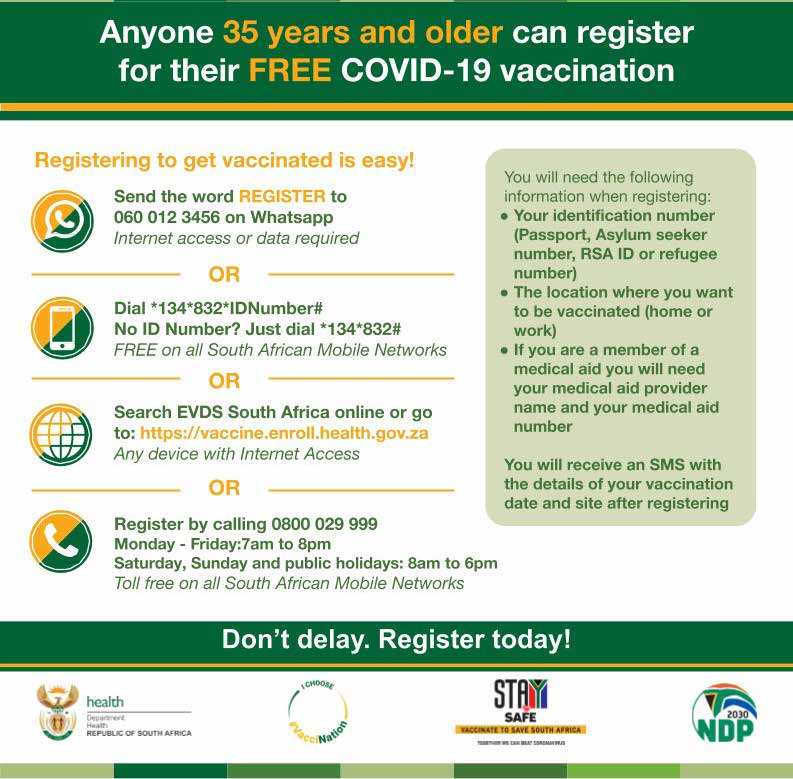
Neeri Stroebel breaks the cycle of poverty
Neeri Stroebel breaks the cycle of poverty SiboneloWomen’s Month pays tribute to South African women who have fought for their rights, including education. One of these inspirational women, Neeri Stroebel (43), experienced poverty growing up and vowed to change the course of her life.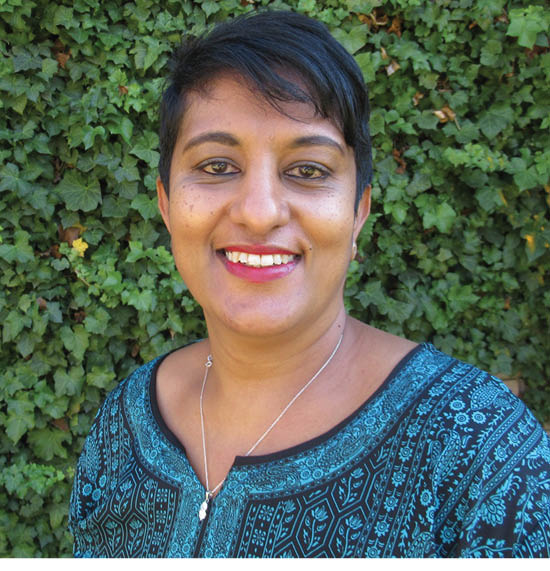
She recently obtained a Bachelor of Commerce in Financial Management from the University of South Africa (UNISA).
Stroebel recalls that her mother could neither read nor write.
“I remember her telling me that she so wished to read and write, but was denied the chance due to the culture and era she grew up in. This forced me to look at education differently,” Stroebel explains.
“I realised I had to educate myself if I was going to end the cycle of poverty,” she adds.
A hard life
Life was hard for the Stroebel family. “There were periods when we had no electricity. One stretch lasted for two years. My mother was the strength that held us together. She made sure we had a warm meal and a bed.”
Through hard work, Stroebel passed matric with exemption. Her next challenge was to convince her mother to allow her to study further.
“I knew we had no money for further education© The only option was to leave KwaZulu-Natal for Johannesburg and live with my brother until I could find a job. I left with R20 for lunch and a bag of clothes,” she says.
Stroebel arrived in Johannesburg in 1996 and gave herself three months to find a job.
“I was a small-town girl, armed with a Johannesburg map and hungry for a job. I got one two months later, but was retrenched.
“I found another job by being gutsy. I told my interviewer I would work for free for five days. If I didn’t meet expectations, I would leave. I got the job,” says Stroebel.
Her mother passed away a year before Stroebel, then 19, received a bursary and enrolled at UNISA in 1998.
Despite her determination, she faced many challenges and abandoned her studies in 2007. “I was juggling too many tasks.”
During a job interview, she was asked why she had not completed her degree.
“This reignited the flame© I started studying again in 2017 and muscled my way through, with two children and work and family commitments.
“In achieving my degree, I also achieved my mother’s goal,” says Stroebel, who now aims to obtain a counselling and communication qualification.
Nolwazi Njilo launches women’s gym
Nolwazi Njilo launches women’s gym tsoanaThe realisation that some women feel uncomfortable exercising in front of men inspired Nolwazi Njilo (24) to open Femactive Studio, a women’s only gym.
Based in Pietermaritzburg in KwaZulu-Natal, Njilo’s gym ensures that women are able to train and exercise in a space where they feel comfortable.
Njilo opened the gym in April.
She has a sport science degree from the University of KwaZulu-Natal.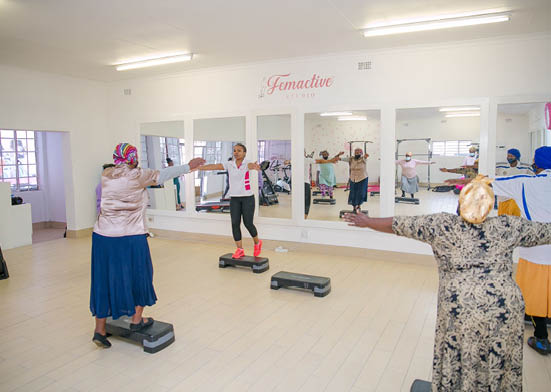
“I also completed my honours degree in exercise science and am now busy with my master’s degree,” says Njilo.
She has completed an internship with the AmaZulu Football Club and also ran fitness testing for the Golden Arrows Football Club, both of which are based in Durban.
At the start of her career, Njilo also coached high school sports teams and worked as a strength and conditioning specialist to help athletes to get back onto the field after an injury.
Eventually, she decided to open her own fitness studio.
“I just wanted to create a space where women can feel free and safe in anything that they choose to wear,” she explains.
The gym caters for all women’s fitness needs, including group training, and offers boxing, steps, functional training, high-intensity interval training, conditioning for the elderly and dancing in heels.
“My clients can train with a personal trainer, but also have the option to facilitate their own training, at their own pace, using any of the equipment,” she says.
Njilo realised that many women, who hadn’t been to gym before, do not know how to use the equipment.
She says they would then only run on the treadmill and leave because they were too scared to ask for assistance.
Her women’s only gym addressed this challenge, as the women feel comfortable asking other women for help.
The National Youth Development Agency (NYDA) gave Njilo R50 000 to buy equipment. “This boosted my business because I could offer clients more,” she says.
The business has created five jobs for women in the community since opening its doors.
For information about NYDA funding, contact 087 158 6345 or email info@nyda.gov.za
Nosipho Simelane goes from student to boss
Nosipho Simelane goes from student to boss SiboneloWhen Nosipho Simelane (27) completed her National Diploma in Film and Television at the Tshwane University of Technology (TUT) in Pretoria in 2019, she became a determined entrepreneur.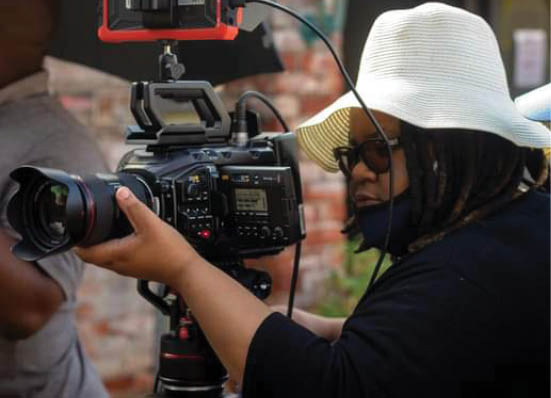
Simelane, who was born in Newcastle in KwaZulu-Natal and now lives in Midrand, is the founder and owner of Nos Creationz, a multimedia business that has been rendering videography, film, photography and graphic services since 2018.
“It all started when I freelanced for gigs, when I was a student,” she says.
To add to her qualification, Simelane acquired further skills and knowledge by shadowing professionals at Vision View Productions.
“I told myself I would not work for anyone else, because I wanted to be my own boss and inspire other women to do it for themselves, no matter where they come from or what their circumstances are,” says Simelane.
“I want to be a millionaire and I believe this goal can be achieved easily when you have your own brand,” she adds.
Nos Creationz has already created two permanent and 12 temporary jobs, and provides services to clients across South Africa.
“I want it to be global one day,” she says.
Simelane approached the National Youth Development Agency (NYDA) and was afforded an opportunity to attend its business management training course.
“I also received a business grant from the NYDA in 2020, which I used to buy equipment. It helped me a lot because I no longer have to rent equipment. I own it now and it feels awesome,” she says.
Simelane also applied to and was accepted into the NYDA Voucher Programme, which assists young entrepreneurs by providing one-on-one business development support. This enabled her to establish her website.
Although her business has done well so far, Simelane says it has been under financial strain due to the Coronavirus Disease pandemic. To recover, the business is focusing more on its digital marketing service, which is its main source of income.
Simelane encourages young women to explore various business opportunities that they can pursue, instead of waiting for job opportunities, so that they can fight poverty and unemployment.
“Do what you love. You have to be hungry for it. Perseverance is key. In the end, always know the end goal of what you want to
do and touch lives,” she says.
For more information about how to apply for NYDA funding, call 087 158 6345 or email info@nyda.gov.za.
Passionate farmer nurtures students' dreams
Passionate farmer nurtures students' dreams tsoanaNomathemba Langa (29) is running a successful farm, which she is also using as a training centre for aspirant farmers and recovering addicts.
Langa is the founder of Inyama Yethu, a 326-hectare farm in the Zvezda Game Resort in Brits in North West, that breeds and raises pigs, cattle, goats and game, and processes the meat in its o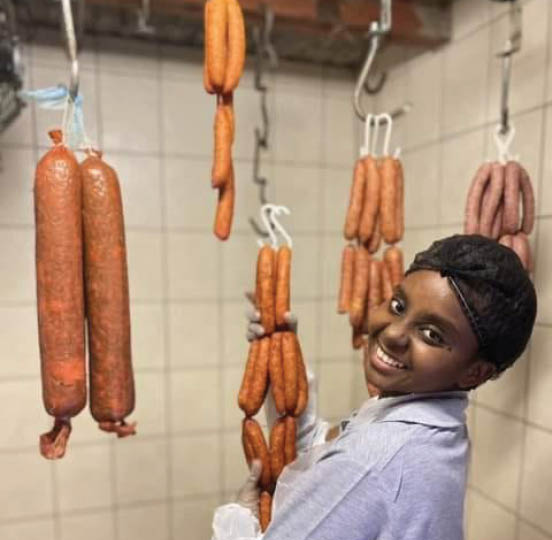 wn butchery.
wn butchery.
Langa registered the business in November 2015, after she underwent piggery training. “After my training, I knew I had to register my own company and comply with the red meat regulations to grow as a business,” she says.
Langa, who has also benefited from other training courses, now mentors final-year students from the Tshwane University of Technology (TUT) and the Tompi Seleke College of Agriculture in Limpopo.
She also trains recovering substance abuse addicts and people interested in farming.
“Helping recovering addicts is my way of giving back to the community, as it is this community that supports our business,” she says.
Her farm is accredited by the Agriculture Sector Education Training Authority (Seta), among others.
“I realised people need proper training when it comes to animal production and business management, and registered our farm with the Setas,” she says.
The accredited training Langa provides helps people who want to venture into agriculture gain entrepreneurial skills that will help them start their own business.
To date, she has mentored 39 students from various tertiary institutions and trained 15 more.
“We offer training throughout the year for third-year students and conduct our own training twice a year,” she says.
Langa received assistance from various entities to boost her business. These include the National Youth Development Agency; Coronavirus Disease Relief Fund for farmers; North West Economic Development Department, which helped her with package design and labelling; and the Small Enterprise Development Agency, which assisted with branding.
Langa advises aspirant farmers to undergo training before they begin.
“You must do a lot of research on the value chain before deciding to rear pigs or other animals. You must also be passionate and patient when it comes to agriculture, and set your sights on achieving your goals,” she says.
Pieter Mmachaka designs a brighter future
Pieter Mmachaka designs a brighter future SiboneloPieter Mmachaka (26) is using his passion for architecture and building design to create beautiful, hand-crafted, three-dimensional house models from recycled materials.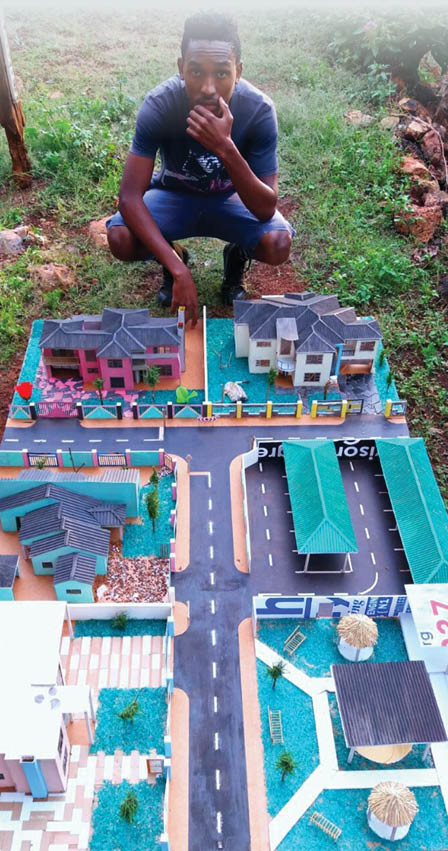
Mmachaka, from Lotus Garden in Tshwane, was born in Ga-Botha Village in Uitvlugt, Limpopo and moved to Atteridgeville when he was six years old.
At the age of nine, he realised he loved to draw and used his maths set to create houses, knowing he could turn his passion into a career one day.
“My mother, Kibe Rosina Mmachaka, brought us a book from her workplace, where she worked as a domestic worker. It was all about various career fields, including architecture," he recalls.
Mmachaka and his brother soon tried their hand at crafts. “I was inspired by my brother and his artistic skills. I was fascinated by how beautiful his crafts were. I tried to make some, but I failed.
“He then taught me how to make crafts using my maths set and squares, and I fell in love with crafts and started making them almost every day, when I didn’t have homework,” says Mmachaka.
Living in a shack in Atter- idgeville also inspired him. “I loved houses from early age and didn’t want to live in a shack my entire life,” says Mmachaka.
Now a crafter for nine years, Mmachaka has honed his skills and loves it when people admire his work.
“When I was young, I didn’t really sell my work, I just took any money if someone wanted to buy it. Now, I sell my work to clients from my home.”
Mmachaka's message to young crafters is to nurture their talent.
“When you nurture your talent, it automatically imp- roves. Knowledge is power. Always educate yourself about what you do and conduct research so that you know the value of what you do.”
He adds that learning is not only about being at school.
“Never complain and use what you have, for example recycle rubbish into crafts. Art is all about creativity and contributing to the economy, while taking care of the environment,” he says.
Mmachaka works at Dithakga House Plan and Building Construction, where he’s being mentored on how to design house plans.
“I love being on-site and seeing how to turn a design into someone’s dream house for them,” he says.
Mmachaka’s goals are to bring change to the economy and environment and create more jobs for a sustainable future.
Relief package supports the needy
Relief package supports the needy JoyGovernment is implementing a range of measures to provide relief to the poor and support the recovery of the economy.

Beneficiaries of these measures include people affected by the Coronavirus Disease (COVID-19) lockdown restrictions and the unrest experienced in some parts of KwaZulu-Natal and Gauteng recently.
“We are taking decisive action now to secure the livelihoods of millions of people who have been threatened by both the pandemic and the unrest.
“We are announcing a range of measures to support the recovery of the economy and provide relief to the poor and those who are vulnerable as a result of the measures that we had to impose to deal with COVID-19,” said President Cyril Ramaphosa.
Social Relief of Distress Grant
The President announced that government is reinstating the Social Relief of Distress Grant, to provide a monthly payment of R350 until the end of March 2022, to assist those who are unable to support themselves.
Government is expanding the number of people who are eligible for this grant by allowing unemployed caregivers, who currently receive a Child Support Grant, to apply.
Finance Minister Tito Mboweni recently said the grant will go a long way in helping people.
“This will cost about R27 billion which we have to find in the system. Looking after our own is not just a cost, but it is an investment that we should see going forward,” he added.
President Ramaphosa said the Department of Social Development is also providing food relief.
“Government is contributing R400 million to the Humanitarian Crisis Relief Fund, established by the Solidarity Fund, to assist with the immediate needs of affected communities,” he added.
Help for businesses
The President said the unrest and looting in Gauteng and KwaZulu-Natal have left communities devastated and impacted negatively on livelihoods.
Government's most immediate action is to ensure that those businesses that were damaged or looted are able to rebuild and reopen as quickly as possible.
Businesses that are insured will be covered by the South African Special Risk Insurance Association (SASRIA).
“SASRIA has committed to expedite the payment of all valid claims, and is working together with private insurers to ensure that assessments are completed without delay.
“Government will ensure that SASRIA is able to honour all of its obligations and will provide whatever support is necessary in this regard,” he said.
Minister Mboweni said the financial backing of SASRIA would amount to R3.9 billion and this figure could be revised in the future.
Uninsured businesses
However, some businesses that were affected by the looting may not have been insured, including many small- and medium-sized businesses, whether formal or informal.
The President said government will provide support for these businesses.
“Many of these businesses have lost everything and will not be able to rebuild on their own. We will not abandon them in their time of need.”
Government has set aside R2.3 billion to support small businesses that are not covered by SASRIA.
“We will also be reprioritising funding for small, medium and micro enterprises (SMMEs) affected by the pandemic through a once-off business survival funding mechanism.
“We are also working with large business to determine their contribution to the support of SMMEs, job creation and eradication of hunger and poverty,” added the President.
Support for workers
Government has also extended the COVID-19 Temporary Employee/Employer Relief Scheme (TERS) to those sectors that were affected by the recent Adjusted Alert Level 4 restrictions.
The Unemployment Insurance Fund (UIF) has set aside R5.3 billion for the extension of the COVID-19 TERS, which will mainly cover those who have lost their jobs due to the lockdowns.
“Applications for this period are open and the UIF will facilitate payments as quickly as possible to support workers who have not received an income.
“Most importantly, the UIF will provide income support to all those employees who have lost jobs as a result of the recent unrest. This will ensure that jobs are protected and that workers can continue to earn an income as those businesses take time to rebuild.”
The President said while the TERS has provided crucial support for many sectors that have been unable to operate, there is a need to provide even further relief to help businesses to recover.
“We are therefore expanding the Employment Tax Incentive for a period of four months to include any employee earning below R6 500 and to increase the incentive amount by up to R750 per month,” he added.
This will encourage employers to hire and retain employees, especially those in the retail and hospitality sectors which have been worst affected.
He added that government is working closely with its social partners on further measures to address poverty, accelerate the implementation of reforms, drive inclusive growth and create jobs.”
Social development feeds the hungry
Social development feeds the hungry SiboneloMuch-needed food relief provided during the Coronavirus pandemic.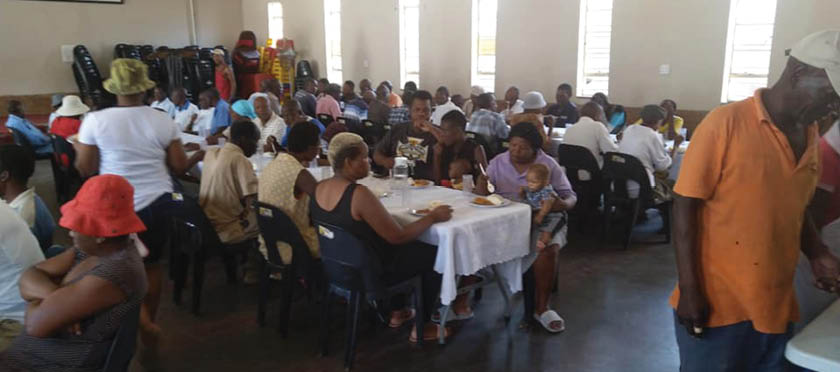
The Department of Social Development (DSD) is providing thousands of needy South Africans with a daily, healthy meal through its countrywide community nutrition and development centres (CNDCs).
According to the department’s Mondli Mbhele, there are 212 CNDCs countrywide that cook and serve lunch to vulnerable individuals, five days a week.
“More than 13 million people are considered food insecure in South Africa. An adequate, healthy diet that satisfies humans’ needs for energy and all essential nutrients is provided by the CNDCs,” he adds.
The programme reaches poor and vulnerable communities living below the poverty line, and provides skills development to women and unemployed youth to help them form social enterprises.
The CNDCs’ cooks are qualified in basic food safety and regularly undertake additional training. All other employees complete an annual in-house training course on safe food practices and hold a basic food handling practices certificate.
The CNDCs receive bulk food from the Provincial Food Distribution Centre at least twice a month. They also buy ingredients from local food producers, such as community vegetable gardens.
Mbhele says the training that cooks receive ensures that they plan, prepare, cook and store meals in accordance with food safety regulations.
“Food choices are considered very carefully, to provide a menu that is sensitive to everyone’s needs and reflects the cultural differences that exist within our communities,” he adds.
Martha Susiwe Tau, the founder of the Vuk’uzenzele CNDC based in Thaba Nchu in the Free State, says the centre feeds about 170 beneficiaries daily.
Due to the Coronavirus Disease (COVID-19) pandemic, meals are no longer served at the centre. They are made up into food parcels, that people take home.
“In the past, people used to sit and eat here,” says Tau.
Mbhele says the CNDCs also help to develop local economies as they ensure food security. “Through the programme, we are also promoting local economic development by procuring food from emerging food producers,” he says.
For more information on the CNDCs, contact the department at 012 312 7727.
Take a leaf out of a cannabis grower’s book
Take a leaf out of a cannabis grower’s book SiboneloA new Eastern Cape farm, that will offer internships to those in cannabis farming, is set to open in December.
A young farmer from the Nelson Mandela Metro in the Eastern Cape has been given a boost by government to start her own cannabis farm.
Sinazo Tshaka (33) is one of the few youth in the country licensed as cannabis farmers.
She is venturing into the cultivation and agro-processing of the cannabis plant, thanks to funding of R917 498 from the Eastern Cape Department of Rural Development and Agrarian Reform’s (DRDAR) Isiqalo Fund.
“I am so grateful for this fund, as I took a leap of faith leaving my accounting profession to start something new,” says Tshaka.
“Cannabis farming includes hemp and marijuana. I focus on hemp, which does not contain tetrahydrocannabinol – the psychoactive compound in cannabis that makes a person high. In agro-processing, we extract cannabidiol,” she adds.
She became interested in cannabis farming in 2017, while undertaking research as a student at Nelson Mandela University, where she studied this line of farming. Once she secured funding, Tshaka got a farm in Elandsrivier, in Uitenhage.
“Farming is expensive, so this funding will help us a lot. We wanted to start working last year, but the Coronavirus Disease pandemic hit South Africa and we had to wait. This December, we will get our hands dirty,” she says.
The Eastern Cape DRDAR also helped Tshaka obtain her permit to farm cannabis; while the National Youth Development Agency helped her to access information and buy equipment.
Tshaka’s project will take in 10 graduates from agricultural schools, each year, to complete their internships in cannabis farming.
“I am going to train these young people to not look for employment, but to rather open their own enterprises so that we have more entrepreneurs,” she says.
Tshaka wants to show young people that there are many ways of making a living, other than formal employment.
“We now have a government that helps us with entrepreneurship, so as young people with ideas we need to go out and start businesses,” she says.
Tshaka encourages the youth not to fear going into career fields they didn’t study for if they are passionate and willing to work hard.
For information on the Eastern Cape DRDAR’s Isiqalo Fund, contact the department at 043 602 5006.
Traditional medicine has a place in modern healthcare
Traditional medicine has a place in modern healthcare JoyTraditional African medicine has earned its rightful place in modern healthcare and should be afforded the same respect as other health disciplines.
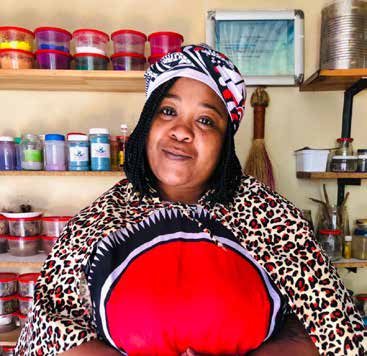 This is according to traditional health practitioner Bontle Moatlhudi, also known as Gogo Nkanyezi, who has been a healer for four years.
This is according to traditional health practitioner Bontle Moatlhudi, also known as Gogo Nkanyezi, who has been a healer for four years.
“The use of African traditional medicine is holistic, in the sense that it involves the use of indigenous herbs and large aspects of African spirituality,” explains Moatlhudi.
“In recent years, we have seen strides being made in including traditional medicine in the health practice. We have indigenous herbs such as lengana, mosetlha and serokolo which are now packaged and available to purchase over the counter at conventional pharmacies,” she adds.
Moatlhudi says the public has, in recent years, shown a level of comfort using traditional medication.
“Of course, this comes with its fair share of responsibilities. The practitioner responsible for dispensing must be initiated, trained and knowledgeable in traditional medicine. One cannot dish out medicine without the proper knowledge.”
She adds that it is also important to acknowledge any other ailments, such as diabetes and/or hypertension, before using traditional medication.
“As with western medication, our medication is meant to heal not harm,” says Moatlhudi.
About 80% of Africa’s population relies on traditional medicine for their basic health needs.
“In some cases traditional medicine is the only healthcare service available, accessible and affordable to many people on the continent.
“The significant contribution of traditional medicine as a major provider of healthcare services in Africa cannot be underestimated,” said the Department of Health in a statement.
Government has committed to including several types of traditional healthcare practitioners, who can be broadly categorised as diviners, herbalists, faith healers and traditional birth attendants, in official services.
“These practitioners are separated by the methods they use to diagnose and treat their patients. They also employ a number of different traditional formularies,” the department added.
The Council for Scientific and Industrial Research has also started collaborating with traditional health practitioners to develop safe and standardised traditional medicines which can be sold.
“Traditional and western medicine can work together for the betterment of our people.
“We all contribute a wealth of knowledge to each discipline and, in so doing, can save the world from many ailments,” says Moatlhudi.
What will people say?
What will people say? tsoanaThere is no excuse for abuse.
People can only help if they know. Tell someone.
Police : 10111
Stop Gender Based Violence: 0800 150 150
Childline: 0800 055 555
Violence and abuse are poison to society. Lets make it stop.
Government Communication and Information System
Republic of South Africa